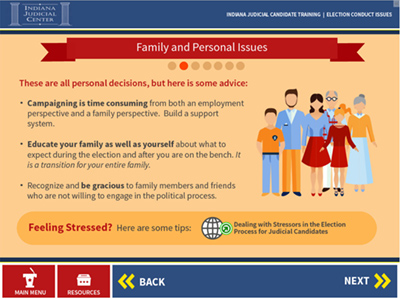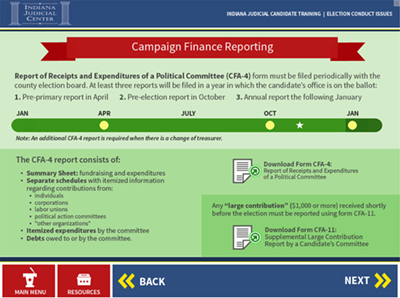The Indiana Judicial Center, with technical support from the National Center for State Courts, has developed a Judicial Candidate eSchool for the 2016 election cycle.
The goal of this program is to provide information on the ethical and legal requirements to which candidates for judicial office are subject during the election process.
Similar programs have been offered in other states, like Ohio, California, and New York. The program is offered to all candidates – both incumbents and challengers.
New judges have often remarked that they wished they had known some important information much earlier than new judge orientation. This program was created to provide those early opportunities. It is not a how-to-get-elected training; rather it is a how-to-comply-with-the-code-of-judicial-conduct-and-election-law training.

The substance focuses on “The Big Es”: ethics, election conduct, employment, engagement (which includes professionalism and coping strategies), and exceptions to general election rules.
Some particulars in the program include whether a candidate must accept all contributions, when a candidate can answer political questionnaires, and whether it’s acceptable for a candidate to promise to hire someone he or she knows.
The substance of the program has been developed by Indiana judges, Judicial Center staff, representatives from the election division at the Secretary of State’s office, along with State Court Administration’s Adrienne Meiring and Brenda Rodeheffer. The most recent class of new judicial officers also provided input to ensure the program is relevant and informative.

The online format allows candidates around the state to participate in the program. First, there are two online, asynchronous (on-demand) modules that candidates can take at any time. These segments will use technology to increase interactivity and improve learning outcomes.
The second portion of the program will be a one-hour synchronous (live) WebEx webinar that will recap the previous modules and provide opportunities for questions and answers.
The end goal is a professional, civil, ethical, level playing field for all judicial candidates, which will improve individual campaigns and the public perceptions of the judicial branch as a whole.